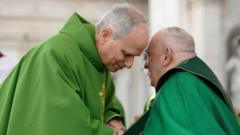As Argentina observes a week of national mourning for Pope Francis, the pontiff's absence is felt deeply in his home country, where appreciation for his global influence is shadowed by a sense of emotional orphanhood. His complex legacy raises questions about political affiliations, public perception, and the spiritual void left behind.
Mourning Pope Francis: A Void in Argentina and Beyond

Mourning Pope Francis: A Void in Argentina and Beyond
The passing of Pope Francis has left many Argentines feeling a profound sense of loss, as they grapple with his absence and legacy amid national mourning.
The recent death of Pope Francis, born Jorge Mario Bergoglio, has profoundly impacted Argentina, leaving many citizens grappling with feelings of loss. As the nation enters a week of mourning, voices from Buenos Aires express their sorrow over the pontiff's absence and the emotional void his passing has created.
Archbishop Jorge Ignacio García Cuerva likened the sentiment among his parishioners to that of being “orphans of a father” who cherished his homeland yet felt compelled to serve globally. Indeed, Bergoglio's journey led him to the papacy unbeknownst to him—what he believed would be a retirement was transformed into a world-leading position for over a decade.
Reflecting on the late pontiff’s homely ties, many recall the mixed emotions that enveloped Argentina when Bergoglio was named the first Latin American pope. While it initially inspired pride, the lack of a return to his native land over twelve years became a source of sadness. Elenir Ramazol, a nun at a vigil in Buenos Aires, remarked that his absence symbolized his unwavering commitment to the global Church rather than just his Argentinian roots.
Gustavo Vera, a close associate of the Pope, noted that despite his physical separation, Bergoglio maintained an interest in his homeland, following diverse aspects of Argentine culture, from soccer to political events. However, his papal duties led him to visit other South American countries while bypassing Argentina, creating a palpable absence felt especially amid the nation’s economic struggles.
While many continue to mourn the beloved pontiff, others harbor complexities in their views of him. Surveys indicated a notable decline in positive opinions among Argentines regarding Francis—from 91% shortly after his election to 64% in 2024. Critics have pointed fingers at him for failing to address undercurrents of Argentina’s troubled past and his ties to controversial political figures, leading to allegations of favoritism among the nation’s divided populace.
Pre-existing political tensions in Argentina complicate tributes to the late pontiff. His ideological leanings have led some, including newly elected President Javier Milei, to label him as representative of leftist ideologies, yet Milei acknowledged the Pope's compassion in his tribute following the papal death.
Despite multiple perspectives on Francis' legacy, many mourners gathered at Buenos Aires Cathedral find solace in remembering that Argentina was always present in his thoughts and prayers. The complex interplay of love, critique, and misunderstanding that characterized Bergoglio’s journey underlines a broader commentary on the nation’s relationship with its most internationally recognized figure.
In reflection, Gustavo Vera suggests instead of solely directing blame towards their late Pope, Argentines might consider how their actions shaped his separation: “We Argentines should ask ourselves what we were doing that meant we did not deserve the Pope's visit.” The final chapter of Pope Francis invites introspection regarding identity, legacy, and the connections among a country, its spiritual leader, and the world.





















